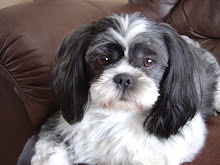
People and dogs have a long and unique relationship, one that is unlike their relationship with any other animal. It's not hard to imagine some prehistoric hunter bringing home an orphaned wolf cub, only to find that it fitted surprisingly well to human society as it grew up. On top of that he would have found it had several very useful contributions to make.
The similarities between the social structures of humans and both wolves and other wild dog packs are striking. There is a hierarchy, usually dominated by an older male, who is often kept on the right track when necessary by a dominant older female. Like a prehistoric human family or tribe would have done, a wolf pack naturally lives and hunts together, surviving through its ability to communicate and cooperate as a group. Just like a human family group, the social bonds and loyalty within the group are uniting forces far stronger than any of the minor tiffs and scraps of daily life.
Now it has to be said that wolves are, by all accounts, difficult to get on with in some respects. Dogs as people know them now are more amenable. But then ancient man (who may not have been all that amenable himself by present day standards) no doubt achieved that change through selective breeding long ago - just as people still manipulate the genetic makeup of dogs in an amazing variety of ways today.
The complementary strengths of dogs, their alertness, their powerful sense of smell and their hunting prowess, no doubt made them welcome members of human hunting expeditions in ancient times. Their low cost of upkeep, as dogs will live on almost anything, including less desirable food scraps, was undoubtedly an attractive added bonus. This long-standing synergy between humans and dogs remains pretty much the same today.
Your dog, whether a guard dog, working dog, hunting dog, or merely a companion, is an intelligent, loyal and faithful friend for life. The raw primitive survival justifications for owning a dog may be less important now, but dogs are still to be found performing many useful roles. You will find dogs herding stock on farms, detecting drug smugglers in airports, guiding the blind, tracking down criminals, guarding secure installations, rescuing in emergencies and, playing to their strengths, doing many other important tasks for humans. Dogs are now being trained to detect oncoming seizures and alerting their owner to this impending medical emergency. They are also being taught how to detect cancer in humans and also impending heart attacks. There have been several instances were a dog indicated that a human had cancer when doctors and all their technical equipment could not detect it at that time, but at a later time did, in fact, determine that the individual was suffering from cancer. These illness detecting dogs are becoming quite popular in Great Britain.
Most dogs, though, are just "one of the family." Dogs will often share living space with their owners and develop a special bond with all the members of a family. You may have noticed how your dog will look concerned for younger family members if they seem to be getting into trouble - moving too far away from the main family group, for example - and everyone knows how eager the family dog is to check out whether any stranger arriving at the door is OK to have around.
Most people know dogs as wonderfully cuddly, friendly and fun companions. They are - if they are properly socialized into their family, well fed, housed and exercised and lead a predictable and stable life. But even a small dog can become unpleasant company, a formidable foe, or even dangerous, if it feels socially isolated, bored, hungry or abused. If a dog senses it does not belong, it's behaviour can become unpredictable, much as humans might behave if held captive and in danger among their enemies. Just like humans, dogs need to feel secure, wanted and part of their human’s family and to know their place in that family's hierarchy.
In view of this close relationship most people have with their canine companions, it is hard to understand why anyone would get a dog and then leave it chained in the yard 24 hours a day, seven days a week. If they do not want to socialize with the dog and make it part of their family, why do they have a dog? And why do some dog owners constantly abuse their trusted friend? It certainly makes you wonder just what kind of people they are.
The sensational arrest and guilty plea of Atlanta Falcons quarterback Michael Vick for dog fighting is one of the most disgusting cases of human abuse of dogs ever reported. Not only did Vick and his associates fight dogs to the death, but they inhumanly disposed of injured dogs in acts of unbelievable savagery. It is incomprehensible that supposedly intelligent humans would stoop so low as to not only watch these vicious fights, but actually treat it like a social event. When you see and hear about these types of things, it makes you wonder who the savages are, the animals fighting or the “animals” watching and betting on them. If vicious dogs are put down, shouldn’t the same penalty be paid by the vicious individuals involved in dog fighting, not only the owners and promoters of these events, but the “animals” that attend them also.
What are your feelings on this topic? Leave comments to let everyone know.
Until next time,
Teia

No comments:
Post a Comment